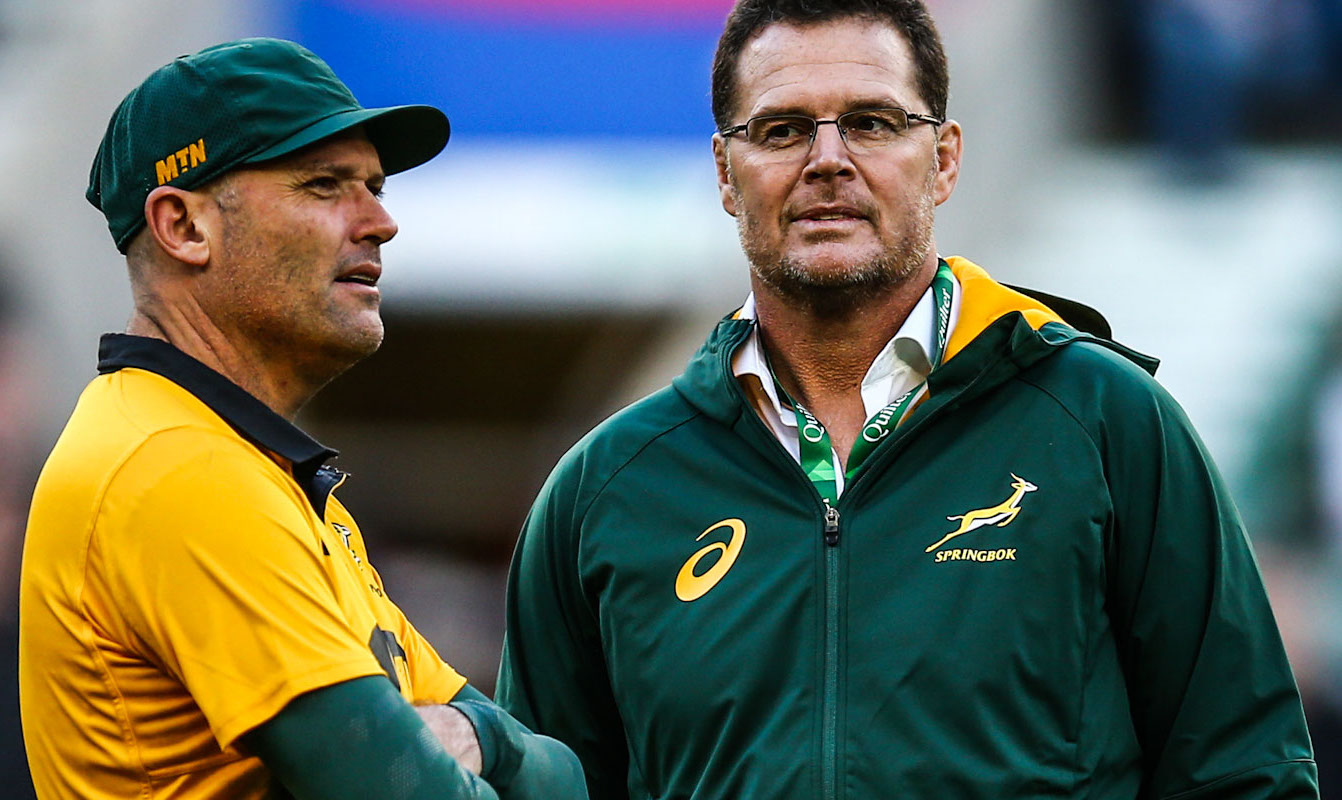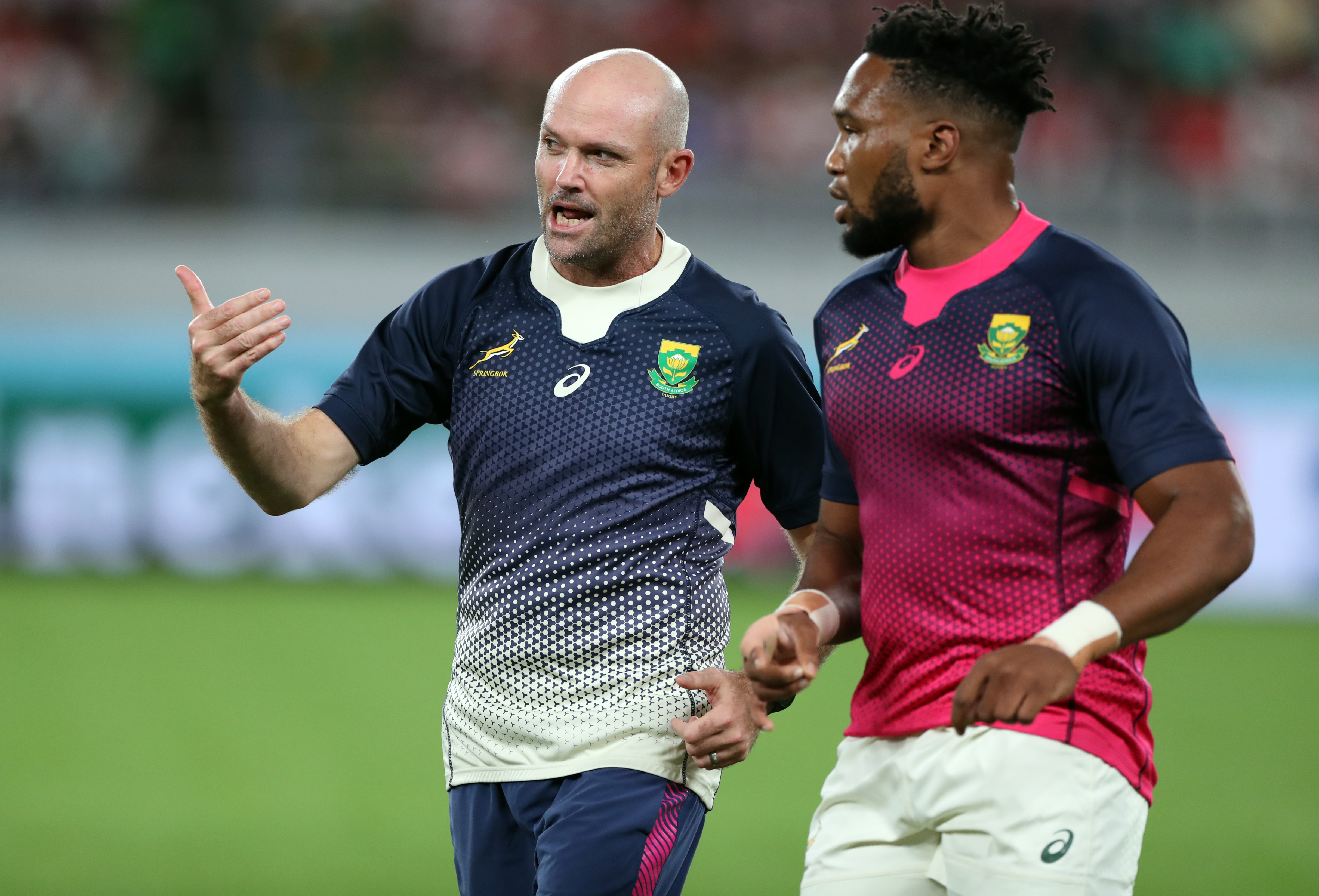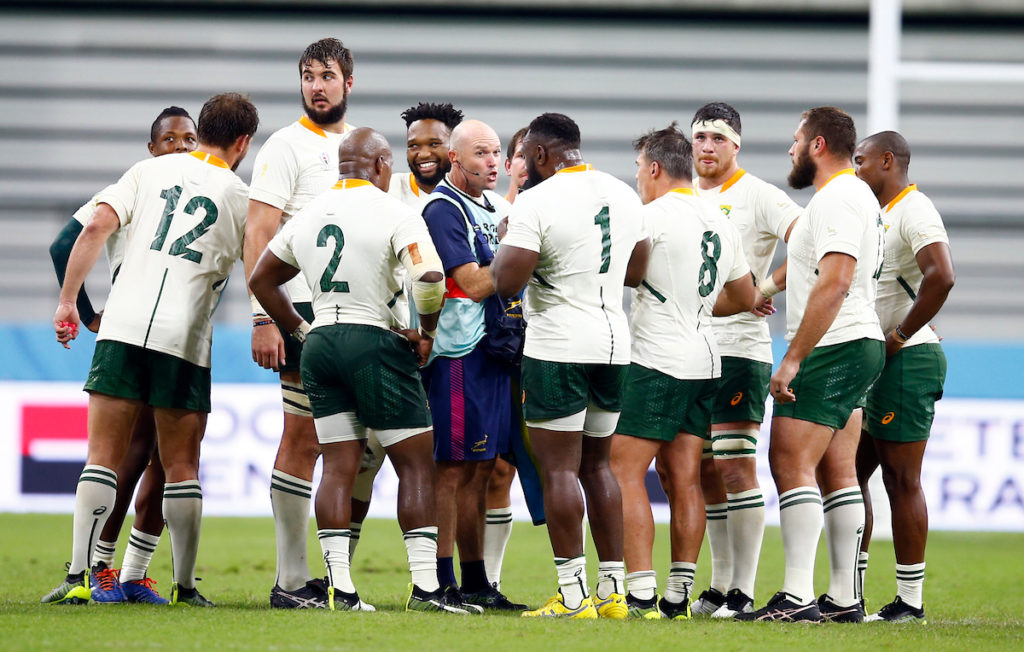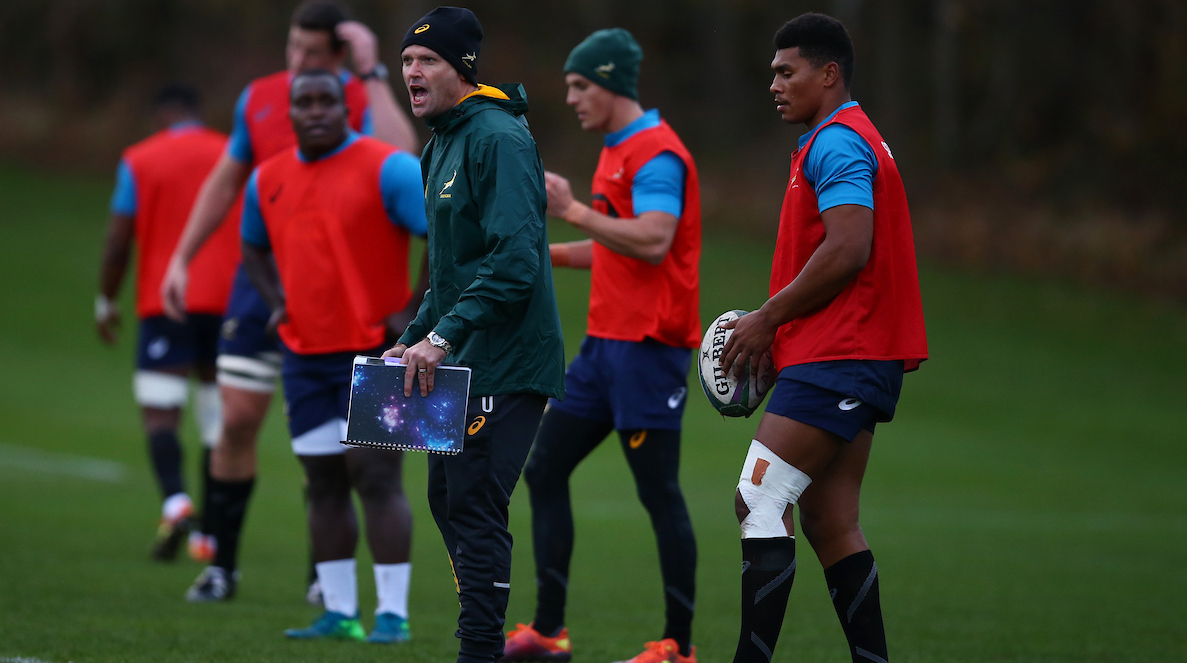New Springbok coach Jacques Nienaber is determined to lead the world champions to even greater heights, writes JON CARDINELLI.
Jacques Nienaber spins in his office chair to admire a frame on the wall. One can deduce from its proximity to the door it’s the first thing he sees when he arrives and the last thing he sees before he leaves.
It houses a green and gold pennant commemorating the series win against the British & Irish Lions and sits above a photograph of the 2009 Springbok team: John Smit, Victor Matfield, Bryan Habana and the rest of the galacticos stare down from the wall. ‘The Golden Age’ declares the label above the picture, as if no team will ever enjoy the same degree of success.
CARDINELLI: Nienaber right man at challenging time
The new Springbok coach turns back to explain why this photograph enjoys pride of place, rather than a memento of South Africa’s World Cup triumph last year. It becomes clear that Nienaber wants the Boks to scale new peaks and surpass the class of 2009 for titles and achievements.
‘Someone gave me that picture a while back,’ he tells me. ‘I found it the other day and it hit me: the Lions haven’t lost a Test series since 2009. They beat Australia in 2013 and drew with New Zealand in 2017. They’re coming here in 2021 to make a clean sweep and we simply can’t let ourselves or the southern hemisphere down. The picture also reminds me about the Bok side of 2009,’ he adds.
‘They won absolutely everything there was to win at that time. We won two big titles last year, but there’s a helluva lot more we want to achieve.’

Nienaber has worked closely with Rassie Erasmus since he was a physiotherapist and Erasmus was a young coach at the Free State Cheetahs in the early 2000s. They have a similar approach to life and rugby, and Nienaber’s elevation to the position of head coach should ensure the Boks keep building over the next four years.
‘Rassie encourages discussion and input from coaches and players,’ says Nienaber. ‘It’s a transparent environment, and having been exposed to that for the past 20 years and having seen the benefits first hand, I would be a fool to make big changes. Rassie and I enjoy a good debate, and while it can be intense at times, we are always on the same page with regard to strengthening the team.’
ALSO READ: Erasmus will remain in coaching box
It’s hard to believe there was a time when Nienaber’s long-term aim was to become the physiotherapist for the national side. As the years progressed, he evolved from physiotherapist to conditioning coach and helped the Cheetahs win three consecutive Currie Cup titles. He started to experiment with defensive patterns in his conditioning drills, and was later named Stormers defence coach. From there, he served as Erasmus’ right-hand man at Irish club Munster and subsequently at the Boks.
‘I didn’t arrive on day one and say, “I want to be head coach of team X in future,”’ he says. ‘I reassessed my goals each time my role changed. What was consistent throughout, however, was my desire to be part of the Springbok management team in some shape or form.’
DUANE VERMEULEN: Nienaber never backs down
Nienaber believes the skills he acquired as a physiotherapist prepared him for the challenging world of professional sport.
‘I was passionate about working in the local ICU,’ he says of his younger days. ‘I see a lot of similarities between working in that environment and performing on the sports field. There’s a lot of pressure. If you don’t perform in the ICU, the patient can die. If you don’t perform in a game, the team can lose.
‘Later, I worked with a few patients whose bodies were covered in burns. I would stretch their limbs and they would cry out in pain. At the same time, I would encourage them. If you can keep someone in that situation in a positive frame of mind, you should have no problem pushing and encouraging a player during a challenging fitness session.’

The Boks were the best defensive unit at the 2019 World Cup. They conceded just four tries in seven games and kept England – who had run the All Blacks ragged – tryless in the final. Erasmus and others in the group have highlighted Nienaber’s innovation, attention to detail and communication as reasons for the team’s success in this department. Now that he’s head coach, Nienaber will tackle a couple more significant challenges.
‘We want to win while transforming our team, developing the depth of our squad and blooding younger players,’ he says. ‘Those three things will never change. Transformation in particular is a priority. The team was a success in that respect at the World Cup.’
WATCH: ‘I like new challenges’
SA Rugby is losing the battle to keep their best players at the Super Rugby franchises. As many as 15 of the 33 players who represented the Boks at the World Cup are playing in Europe and Japan. An alarming number of South African players have left the country to pursue careers overseas in recent years, and there is a perception that SA Rugby is losing the battle to keep players at their Vodacom Super Rugby franchises.
In a non-World Cup year, players based in Europe and Japan are released to their national teams in the World Rugby-sanctioned Test windows. In the past, coaches like Rassie Erasmus have had to accept that they won’t have access to key players until a few days before the first game of the season.
This year, however, assistant coach Felix Jones will be tasked with monitoring and communicating with the South African players in Europe. It’s hoped Erasmus and Nienaber will be able to keep tabs on their national assets and better prepare for the Test season.
‘Let’s be fair, some of those players are earning what a tier-one Test player who has won a World Cup should be earning,’ says Nienaber in the latest issue of SA Rugby magazine. ‘We just can’t compete with what clubs are paying in England and France. We have to think outside of the box.
‘In Afrikaans, we say, ’n boer maak ‘n plan, but I think it’s more of a South African thing in general. We make plans when the going gets tough. We live in a third-world country and we have to compete in so many areas, not just in sport. To stay competitive, we have to adapt and innovate.
‘I think it’s a masterstroke by Rassie to get Felix involved in Europe. In a sense, Felix will be doing union visits much like we do here in South Africa, with myself and the assistant coaches travelling to the franchises to speak to players. We can’t stop players from going overseas, so we have to find a way to remain in touch.’
Nienaber believes, however, the players should be more discerning about where they play in Europe.
‘We’d like to be more involved to ensure these players go to clubs where there is a good coaching and conditioning programme,’ he says. ‘That way they will gain some knowledge while they are away and will remain in top condition. You also want them to go to a club that’s big on player management.
‘The last thing you want is players featuring in every club game over a period of two or three years until they are completely burned out. You’re hoping that the club will take a long view and manage the player accordingly. It’s an attitude that will benefit everyone concerned.
‘We hope the players get this right through their agents. Rassie works closely with the relevant parties in this department, but it will also affect me as the coach. If a player is at an overseas club that doesn’t tick those boxes, we will have to find a creative solution.’
Will the players kick on after winning the Rugby Championship and World Cup last year? Nienaber says it’s unrealistic to expect every one of those Boks to replicate their 2019 form.
‘A lot of people view the World Cup as the ultimate. Once they’ve won that, they’ve realised their dream. There’s nothing wrong with that. To cite an example in another sport, some golfers are satisfied if they win one Major. Others want more. I would hope that most, if not all, the players who featured in Japan last year fall in the latter category.
‘We will only know how much they want it when we see them play Super Rugby or when they play in the first few Tests,’ he says. ‘Talking about performing is easy. I can make strong statements like, “The Boks are not done yet!” but words count for little. My actions and how I plan will reveal how serious I am about this goal.
‘The same applies to the players. Every guy will talk a good game, but you have to judge him by his performance. We will see in the next year or so who is interested in taking it further and who is struggling to live up to our expectations.’
NIENABER: No egos between Rassie and I
Nienaber clarifies that the coaches will allow some leeway as long as the players show the same hunger and desire that characterised the team in 2019.
‘I don’t think that any player will hit the same form we saw at the World Cup. It took each player 20 weeks in our system to reach that level, so we can’t expect that right off the bat when we play Scotland and Georgia this July.
‘Nobody will start at zero, though, and I would hope each player takes fewer than 20 weeks to get back to their World Cup form. You will see who wants it, though, who still wants to contribute. I’ve already noticed that desire in some of the guys competing in the overseas competitions. It’s encouraging.’
Before I leave, Nienaber swings round again to look at the pennant and photograph. I ask him what it would mean to take things forward in 2020 and to slay the Lions in 2021.
‘It would be a dream come true,’ he admits. ‘I know that some people spoke about World Cup hangovers and so on at the start of the season. What everyone needs to remember is that there was another team who went further after winning a World Cup.’
He points to the class of 2009. ‘They did it, so why can’t we? We achieved something special last year, but I truly believe that we are destined for more.’
Photos: Steve Haag Sports/Hollywoodbets/Gallo Images/






